Nutrition - Part 4: Homemade Dog Food
This last article in our canine nutrition series focuses on homemade dog food. Previous articles have covered the basics of commercial dog food, basic nutrient requirements, and the difference between various types of food.
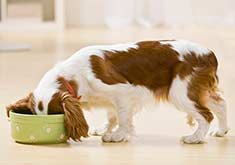
Feed your dog a varied diet
Turns out that what your mother told you was right, not only for you but for your dog. A varied diet really is the best thing for you. Even if you choose to feed commercial dog food, many experts recommend that you change to different flavors regularly to provide your dog with a wide variety of nutrients.
The basic nutritional needs of your dog can be summed up as about 40 - 45% protein, 30 – 35% complex carbohydrates, 15 – 20% fats, and 5 – 10% fruits and vegetables. Most, if not all of these foods, can be fed raw, simulating the way your dog would eat in the wild. If desired, or if your dog appears to like it better, there is no harm to lightly cooking foods before your feed your dog. However, overcooking will result in a loss of important vitamins and minerals.
As you switch your dog from commercial food to homemade, be sure to mix the two foods together for a week or two to allow your dog’s digestive system time to get used to the new diet. At first, mix about Ľ of the new food with ľ of the old, then go to a 50:50 mixture, then to ľ new with Ľ old, and finally to all new.
Protein sources
The primary source of proteins for your dog should be meat. It doesn’t matter if you choose beef, chicken, turkey, fish, or lamb, the bulk of your homemade food should be animal-based. Fish should be fed at least twice weekly because it contains essential fatty acids. In addition, pre-cooked canned fish such as sardines and mackerel contain bones, an important source of calcium for your dog.
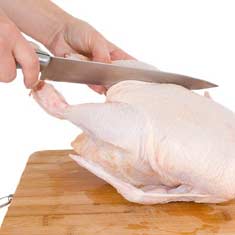
Organ meats such as liver and kidney are rich in vitamins and other nutrients and can be a flavorful treat for your dog, but should be limited as they are too rich for daily feeding.
The cool thing about feeding your dog meat is that you don’t have to worry about giving him prime cuts. He is just as happy with ground beef as he is with prime rib. One good way to prepare meats is to boil them, reserving the stock to use in preparing whatever carbohydrate you choose. Doing this allows you to get every ounce of nutrient out of the food with no waste. You may feed the meat in stew-sized chunks, or you can puree it in a food processor before serving.
It is important, no matter what kind of meat you choose, that you do not season the food. Although seasoning adds flavor, it is not necessary for your dog, and can be too much for his digestive system to handle. In fact, this is the key difference between feeding “table scraps” and feeding homemade dog food. The only possible exception is garlic, which may be helpful in controlling fleas, however it is important not to give too much garlic as it can be toxic in high doses.
Carbohydrates
Carbohydrates can be divided into two classes: simple and complex. Simple carbohydrates, also known as high glycemic index foods, pass directly from the intestine into the bloodstream. They give a quick rise to the blood sugar, but just as quickly it falls, causing sleepiness and hunger soon after eating.
On the other hand, complex carbohydrates are broken down more slowly. These low glycemic index foods provide a longer-lasting boost to blood sugar and are an excellent source of energy for your dog. Most complex carbohydrates are also bulky, meaning they will make your dog feel full sooner and eat less, resulting in less waste for you to clean up.
The carbohydrates easiest for your dog to digest are white rice, oatmeal, and whole grains like wheat or barley. These can be prepared according to label directions, or you can use the stock set aside from when you boiled your meat.
Fats
Adding a limited amount of fat to your dog’s diet is important for a number of reasons. Fat-soluble vitamins A, D, E, and K are carried in fat throughout the body. Also, fats are important for skin and coat health and neurological development in puppies. Any animal-based protein will have some fat in it, and meats should not be drained of fat after cooking. Most animal fats are saturated, meaning that they are in solid form at room temperature. These are the types of fat your dog can burn as fuel.
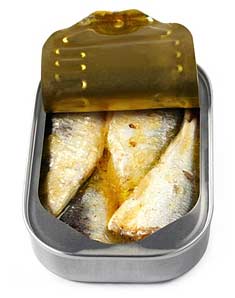
Unsaturated fatty acids are either omega-3 or omega-6. These fats cannot be made by the body, and are thus “essential” to the diet. Fish oils are a rich source of unsaturated fatty acids, as are evening primrose oil and safflower oil, but since fish oil is from an animal source it may be a better option. Probably the easiest of these to find (outside of health food stores) is fish oil – simply ask your pharmacist for cod liver oil. (Remember – mama was right!)
Fruits and Vegetables
Although these are not required in your dog’s diet, they do add flavor, variety, and many vitamins and minerals. They may also be used as a source of fiber and bulk, making your dog feel full sooner. Bananas, papayas, apples, pears, blueberries, canned pumpkins (not pumpkin pie filling), carrots, green leafies, and zucchini are all good choices. These may be fed raw or steamed if you have time. Frozen vegetables can be a great time-saver without sacrificing too many nutrients.
Dairy Products
Dairy can be an important source of protein to your dog, but some dogs will get diarrhea from too much milk. Yogurt, cottage cheese, and ricotta cheese are excellent sources of calcium and protein.
Eggs can be served raw or cooked, and the shells should be ground up and included in the food for extra calcium.
Foods to avoid?
Many foods have been found to be toxic to dogs. This is why feeding table scraps is a bad idea. You might not think about the fact that your dinner contains onions or mushrooms, but they can cause anything from stomach upset to death in a dog. The following items should never be fed to a dog:
- Alcoholic beverages
- Avocadoes
- Baby food (may contain onion powder)
- Cat food
- Chocolate
- Coffee or tea
- Corn on the cob (the corn is okay, but the cob may obstruct the digestive tract)
- Citrus oil extracts
- Grapes and raisins
- Hops
- Macadamia nuts
- Marijuana (no special brownies for your dog!)
- Mushrooms or other forms of mold and fungi
- Nutmeg
- Onions or onion powder
- Walnuts
- Xylitol (found in sugar free candies and gum)
There are a ton of dog food recipes available online, but make sure you read them carefully to make sure they don’t have any toxic ingredients such as those listed above.
Making homemade food for your dog can take as little time as opening a can of sardines to mix in with his kibble or as much time as preparing a gourmet meal with all of the trimmings. Experiment with different ingredients, keeping the basic proportion of 40 - 45% protein, 30 – 35% complex carbohydrates, 15 – 20% fats, and 5 – 10% fruits and vegetables. You will know exactly what your dog is eating, and should see results such as less waste in the yard and a healthier coat within 3 – 4 weeks.
Doggies Den: Latest Articles
 Homemade Thanksgiving Treats for Your Dog
Homemade Thanksgiving Treats for Your Dog
NUTRITION We all want to include our dogs in our holiday celebrations, but hopefully, you're aware that sharing table scraps with your dog isn't always the best idea.
 Keeping Your Dog Safe during the Summer Months
Keeping Your Dog Safe during the Summer Months
HEALTH Summer is coming on fast, so it’s time to plan how you will keep your dog safe and healthy through the lazy, carefree, warm days.
 Vaccination Time Again-Keeping Your Puppy Healthy
Vaccination Time Again-Keeping Your Puppy Healthy
DOG HEALTH So you have your new puppy picked out. There are quite a few shots, treatments and examinations that will keep the newest member of your family healthy.
 Canine Thanksgiving Feast
Canine Thanksgiving Feast
NUTRITION With the wide variety of food at Thanksgiving dinner, chances are you'll want to give your dog something special, too. If you're contemplating what to feed your dog for the holiday, here is a guide to a great Canine Thanksgiving Feast.
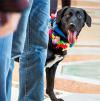 Dog Walking Tips Every Owner Should Know
Dog Walking Tips Every Owner Should Know
DOG FUN Walking your dog is not only crucial to keeping him healthy and happy, it strengthens the bond between your canine friend and his caregiver. There are a lot of obstacles out there. Don’t forget these simple tips to keep your walk fun and safe in the outside world.
 The Benefits of Physiotherapy for your Dog
The Benefits of Physiotherapy for your Dog
HEALTH The same techniques that physiotherapists use to treat a variety of injuries and conditions in humans have been adapted to suit animals with great success. Family pets, show dogs, and working dogs can all benefit greatly from physiotherapy. Dogs whose activities involve a lot of agility are especially susceptible to the types of problems that physiotherapy can address.
 The Decision- Adding a Dog to Your Family
The Decision- Adding a Dog to Your Family
FIRST TIME OWNERSBringing a dog into your family is a decision where many people don’t realize it’s magnitude until after they have the dog. There are a number of things that you need to research before you decide to purchase a dog, and it starts right in your own home.
 Bringing Your Dog Into Your New Baby's Life
Bringing Your Dog Into Your New Baby's Life
HEALTH Many believe that a dog and a new baby cannot happily coexist, so therefore the dog has to go. This is not necessarily the case.  A new baby does not mean you have to abandon your dog.

Doggies Den:
Most Popular Articles
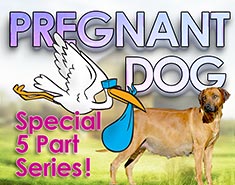
Dog Pregnancy Symptoms
HEALTHIf you suspect your dog might be pregnant, check out part one in this series on pregnant dogs, where we cover pregnant dog symptoms.
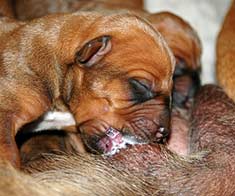
Dog Birth
HEALTHIn the third article of our dog pregnancy series, we look at the wonderful, but messy, process of bringing newborn puppies into the world.
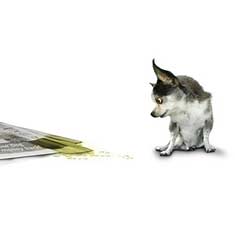
Indoor Dog Potties
DOG PRODUCTSIt's been a long day at work. You were so busy, you didn't even take time to eat a sandwich, let alone run home to let your dog out. You're on your way home, knowing the poor dog is crossing his or her legs by now, when your car breaks down, delaying you even further. Can't somebody make this easier?
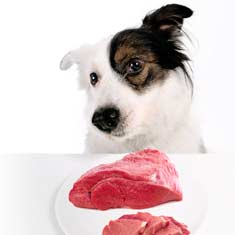
Your Dog’s Digestive System
PHYSIOLOGYEver wonder why your dog eats so fast? Or why he eats gross things? Or why he gets sick to his stomach? Or why his waste stinks so bad? Some of these things are normal, some are not.

Canine Respiratory System
BREATHINGThe basic function of your dog's respiratory system is to bring oxygen in to and remove carbon dioxide from the body. Knowing the symptoms of respiratory diseases can help you help your stay healthy.
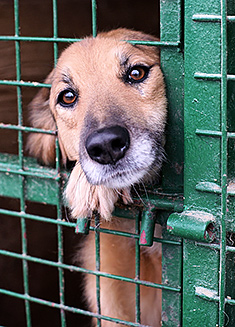
Shelter Dog Adoption Tips for Success
ADOPTION Are you intimidated by the prospect of "rescuing" a dog from a shelter? One reason that you may be wary of adopting a dog from a shelter is not knowing how to choose. Adopting a dog from a shelter can be a rewarding process, if you're prepared to do a reasonable amount of research.
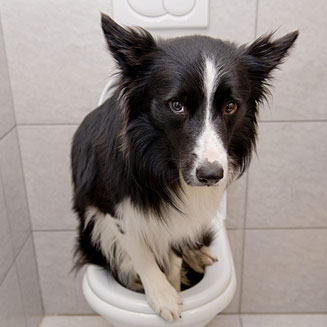
Canine Urinary Tract Infections
SYMPTOMS AND TREATMENTDoes your dog seem to be having trouble relieving his or her bladder? Learn how to recognize the signs of urinary tract infections and how to treat them before they spread.

What to do for Dog Diarrhea
SYMPTOMS AND REMEDIESIf you have dogs in your house for any length of time, you have likely experienced at least one bout of dog diarrhea. Beyond the pain in the tuckus involved in cleaning up the mess, you should know what causes diarrhea, and when it's important to see the vet.
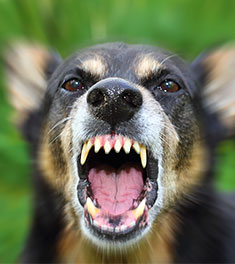
What to do for a Dog Bite
DOG BEHAVIOR Getting bitten by a dog can be scary, and you may be tempted to run around in circles for a while, trying to figure out what to do. Here's our guide to help you manage the situation.
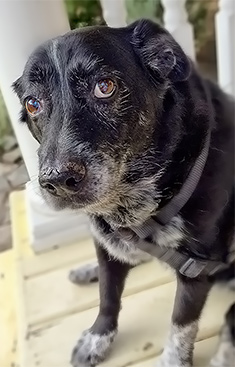
Top Ten Tips for Living with a Senior Dog
DOG HEALTH Bringing home a new puppy is so exciting, but it doesn’t take all that long for your exuberant puppy to grow into a senior dog who may have special needs. Here are the doggies.com top ten tips for taking care of your companion who has been with you through so much.
